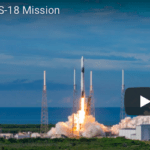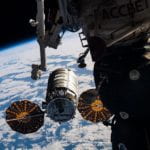 After a couple of delays, the SpX-18 (Dragon) launched successfully on a Falcon 9 SpaceX rocket on Thursday, 26 July 2019, at 6:01pm. The entire video of the launch, as well as the first stage recovery, is shown below. Included on this space mission is a small satellite — RFTsat — that contains a special passive microwave sensing system designed and built by a team of Northwest Nazarene University and the GTPG. The low-powered microwave reader converts solar power to a microwave beam that energizes a rectenna at distance, which powers a sensor platform at distance. Among other things, this is a history-making piece of hardware — the first demonstration of a 5.8 GHz solar-to-microwave-to-DC wireless power conversion in space. Read more about reader and tag system here.
After a couple of delays, the SpX-18 (Dragon) launched successfully on a Falcon 9 SpaceX rocket on Thursday, 26 July 2019, at 6:01pm. The entire video of the launch, as well as the first stage recovery, is shown below. Included on this space mission is a small satellite — RFTsat — that contains a special passive microwave sensing system designed and built by a team of Northwest Nazarene University and the GTPG. The low-powered microwave reader converts solar power to a microwave beam that energizes a rectenna at distance, which powers a sensor platform at distance. Among other things, this is a history-making piece of hardware — the first demonstration of a 5.8 GHz solar-to-microwave-to-DC wireless power conversion in space. Read more about reader and tag system here.
RFTsat Launch Rescheduled to Thursday, 26 July 2019, 6:01pm EDT
 After a launch scrub Sunday, then again Wednesday (weather), the CRS SpX-18 (Dragon) launch is re-scheduled for tomorrow evening Thursday, 26 July 2019, 6:01pm. The launch info can be tracked here.
After a launch scrub Sunday, then again Wednesday (weather), the CRS SpX-18 (Dragon) launch is re-scheduled for tomorrow evening Thursday, 26 July 2019, 6:01pm. The launch info can be tracked here.
A Message from the Program Director About the Launch
RFTSat is going to launch in less than 1 week! RFTSat will be delivered to the International Space Station (ISS) as cargo aboard a Space-X Falcon 9 rocket. It will be stored on the station for about 1 week and then its dispenser (a spring-loaded box that holds RFTSat) will be bolted to the hatch of a Cygnus resupply vehicle. The Cygnus vehicle will un-dock from the ISS, propoel itself to a higher altitude, and then release RFTSat into orbit. If you are interested, you can live stream the launch of RFTSat on NASA TV. Here is the NASA TV schedule is here is the main NASA TV page for streaming. Details are as follows:
RFTSat Launch: July 21, Sunday
5 p.m. – Replay of SpaceX CRS-18 What’s On Board Briefing (All Channels)
7 p.m. – Coverage of the SpaceX CRS-18 Launch; launch is scheduled at 7:35 p.m. EDT. SpaceX CRS-18 is a Commercial Resupply Service mission to the International Space Station (All Channels)
Deployment of Cygnus Vehicle from ISS (with RFTSat mounted on the hatch): July 27, Saturday
12 p.m. – Coverage of the Departure of the Northrop Grumman Cygnus CRS-11 Cargo Craft from the International Space Station; release time is is 12:20 p.m. EDT (All Channels)
Joshua Griffin, PhD
Associate Professor of Engineering
Northwest Nazarene University
Launch of RFTSat this Sunday!
 This Sunday, a Falcon 9 rocket will launch a SpaceX Dragon capsule that will rendezvous with the International Space Station. Part of this mission will include RFTSat, developed by a team of Northwest Nazarene University (Boise, Idaho) led by Prof. Joshua Griffin and a team of Georgia Tech Researchers in ECE. This CubeSat experiment will have a unique RF energy-harvesting radio designed and built by the Georgia Tech Propagation Group. PhD student researcher Cheng Qi has built a one-of-a-kind microwave backscatter reader and tag-sensor combo that will drive the mission science package.
This Sunday, a Falcon 9 rocket will launch a SpaceX Dragon capsule that will rendezvous with the International Space Station. Part of this mission will include RFTSat, developed by a team of Northwest Nazarene University (Boise, Idaho) led by Prof. Joshua Griffin and a team of Georgia Tech Researchers in ECE. This CubeSat experiment will have a unique RF energy-harvesting radio designed and built by the Georgia Tech Propagation Group. PhD student researcher Cheng Qi has built a one-of-a-kind microwave backscatter reader and tag-sensor combo that will drive the mission science package.
The low-powered reader designed by our team deploys a sensor that unfurls a distance away from the spacecraft. The reader then energizes and receives backscatter information from the device using a 5.8 GHz transmission. The launch info can be tracked here. Interesting articles on the launch can be found here and here.
The project was funded by NASA, but could not have been completed without private matching funds from the Space Solar Power Institute. Complete with generator, retrodirective antenna, and rectenna harvester, the radio package qualifies as the first microwave space-based solar power satellite ever tested — despite the somewhat limited 1m range. You have to start somewhere!
- « Previous Page
- 1
- 2
- 3
- 4
- 5
- 6
- …
- 16
- Next Page »